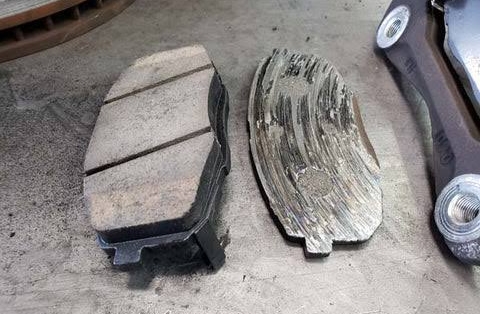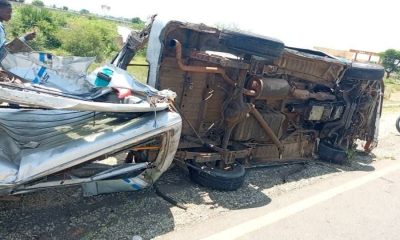Crash News
How to Detect and Prevent Brake Failure Before It Happens

Every day, thousands of vehicles ply Nigeria’s highways from compact cars and interstate buses to overloaded trailers and oil tankers. But behind the hum of engines lies a quiet, deadly threat that causes more road fatalities than most realize: brake failure.
Also Read:When Brakes Give Up at Top Speed: How to Survive a 100 km/h Failure
According to the Federal Road Safety Corps (FRSC), mechanical failures, especially faulty braking systems are responsible for nearly 20% of major crashes recorded annually across Nigeria’s highways (FRSC Annual Report, 2024).
From Lagos-Ibadan to Lokoja-Abuja and Benin-Sagamu, countless tragedies trace back to one common cause: a driver ignored the warning signs.
Brake failure doesn’t happen in one second. It builds up through neglect, overuse, or bad maintenance until one fateful day when pressing the pedal produces nothing but panic.
This RoadKing investigation explains how to detect early warning signs, understand what causes brake failure, and prevent it before disaster strikes.
1. Understanding How Vehicle Brakes Work
Before diagnosing the problem, you must understand the system. The braking system converts kinetic energy (motion) into heat through friction, slowing the wheels.
In most modern vehicles, the system has three parts:
- Hydraulic (fluid pressure): Brake fluid transmits the force from the pedal to the brake pads.
- Mechanical (frictional): Pads or shoes press against discs or drums to create stopping friction.
- Electrical (ABS systems): Anti-lock Braking Systems help prevent skidding during emergency stops.
When any part of this system becomes compromised leaks, air bubbles, overheating, worn pads, braking performance drops, sometimes catastrophically.
2. The Most Common Causes of Brake Failure
Here are the top causes FRSC engineers, auto mechanics, and insurance investigators identify across Nigeria:
- Worn-out brake pads or shoes:
Over time, friction material thins out, causing metal-on-metal grinding that can destroy the rotor. - Low or leaking brake fluid:
A small leak in the brake line means hydraulic pressure drops — resulting in spongy or non-responsive pedals. - Overheating due to overuse:
Long downhill braking (common in hilly terrains like Obajana or Mambilla Plateau) can cause brake fade — when heat reduces friction. - Faulty master cylinder:
This is the heart of the hydraulic system. Once compromised, even full pedal pressure won’t stop the car. - Neglected servicing or fake parts:
Poor maintenance culture and counterfeit brake pads — widely sold in Nigerian markets — have become deadly. - Brake line corrosion and air bubbles:
Rusted lines or improperly bled systems allow air inside, leading to sudden pressure loss. - Overloading:
A common Nigerian problem — lorries, tankers, and buses often exceed load limits, pushing braking systems beyond their design capacity. - Improper modifications:
Many local mechanics alter brake lines or change pad sizes without matching manufacturer specifications.
3. Early Warning Signs of Brake Trouble
Recognizing symptoms early is the key to prevention. Experts say the following signs should never be ignored:
- Squealing or grinding noise when braking
- Soft or spongy pedal feel
- Vehicle pulling to one side during braking
- Vibration or wobbling when stopping
- Brake fluid stains under the vehicle
- Warning light on the dashboard (ABS or brake light)
- Unusual burning smell after heavy braking
If your car exhibits any of these signs, don’t dela inspect immediately. Many fatal accidents could have been prevented by simply checking a ₦2,000 brake fluid leak in time.
4. Why Brake Failure Is Deadlier in Nigeria
Nigeria’s unique driving environment makes brake-related crashes particularly catastrophic:
- Bad roads amplify stress on brake systems.
- Heavy traffic means frequent stop-and-go braking.
- Steep terrains (e.g., Abuja-Lokoja road) overheat pads easily.
- Counterfeit spare parts flood the market, often made of substandard materials that wear out quickly.
- Poor maintenance culture means many drivers wait until failure occurs before visiting a mechanic.
In 2024, FRSC reported over 4,000 road crashes linked to brake failure alone, many involving commercial buses, articulated vehicles, and private cars overloaded with passengers or goods.
5. Expert Advice: Preventive Measures That Save Lives
To keep your braking system in top shape, RoadKing’s automotive experts and FRSC officers recommend the following:
Routine Inspections
- Check brake fluid levels weekly.
- Replace brake pads every 20,000–40,000 km depending on driving style.
- Flush brake fluid every 2 years to prevent moisture contamination.
Smart Driving Habits
- Avoid resting your foot on the brake pedal.
- Use engine braking (downshifting) on steep descents instead of continuous pedal use.
- Maintain a safe following distance to reduce sudden braking.
Choose Genuine Parts
- Purchase brake components from certified dealers.
- Avoid markets notorious for counterfeit parts — many fake pads contain compressed wood or sand.
- Ask your mechanic for proof of authenticity.
For Heavy-Duty Drivers
- Inspect air-brake compressors before each trip.
- Drain air tanks daily to remove moisture.
- Monitor brake pressure gauges constantly during long hauls.
Educate Drivers
Many brake failures are not mechanical but behavioural, ignorance behind the wheel.
Commercial fleet owners must organize quarterly maintenance seminars. Private car owners should demand diagnostic checks before long trips.
6. Real Incidents: When Warnings Went Ignored
The Ojuelegba Tragedy
In 2023, a container-laden truck lost its brakes while descending the Ojuelegba Bridge in Lagos, crushing several vehicles. FRSC later traced the cause to worn pads and poor maintenance. Twelve lives were lost, all preventable.
Kano–Zaria Highway Crash
A bus driver noticed a stiff brake pedal two days before a scheduled interstate trip but ignored it. The following weekend, the bus rammed into a stationary truck, killing eight passengers instantly. The post-crash inspection revealed an empty brake-fluid reservoir.
7. Emergency Response: What to Do When Brakes Fail
If you experience sudden brake failure while driving:
- Stay calm. Panicking worsens reaction time.
- Pump the brake pedal rapidly — sometimes pressure rebuilds temporarily.
- Downshift to lower gears (manual or automatic).
- Engage the handbrake gradually, not suddenly.
- Steer towards the shoulder or an uphill road.
- Use the horn and hazard lights to warn others.
- Don’t switch off the ignition mid-drive — it locks the steering.
- Once stopped, place a reflective triangle behind your vehicle and call emergency services immediately.
8. Building a Culture of Brake Awareness
In developed countries, brake maintenance is as routine as refuelling. In Nigeria, however, many drivers go months without opening their bonnet.
To change this, experts recommend:
- Incorporating mandatory brake inspection days at motor parks.
- Establishing FRSC-partnered brake test stations nationwide.
- Including brake-awareness lessons in driving school curriculum.
- Encouraging media outlets (like RoadKing.ng) to continuously educate drivers.
A national brake-safety campaign could save thousands of lives annually.
9. The Future: Smart Braking Systems and Technology
Modern vehicles now include advanced safety systems like:
- Electronic Brakeforce Distribution (EBD)
- Automatic Emergency Braking (AEB)
- Brake Assist and Traction Control
However, Nigeria’s used-car market still dominates with older models lacking these features. As the country transitions towards electric vehicles and newer fleets, enforcing minimum brake safety standards is critical.
10. Conclusion: Prevention Is Always Cheaper Than Repair
Brake failure is not destiny, it’s negligence. Every crash traced to faulty brakes reflects a story of oversight, procrastination, or poor maintenance.
As drivers, mechanics, and regulators, we all have roles:
- Drivers must maintain and report early signs.
- Mechanics must prioritize safety over shortcuts.
- Regulators must enforce technical inspections.
Only then can we end the recurring horror of “brake failure” as a headline cause of death on Nigerian roads.



















